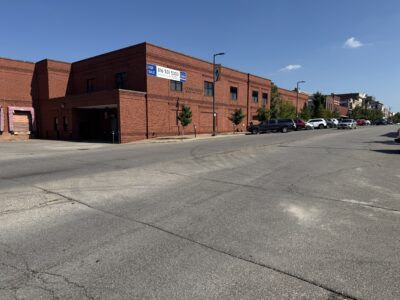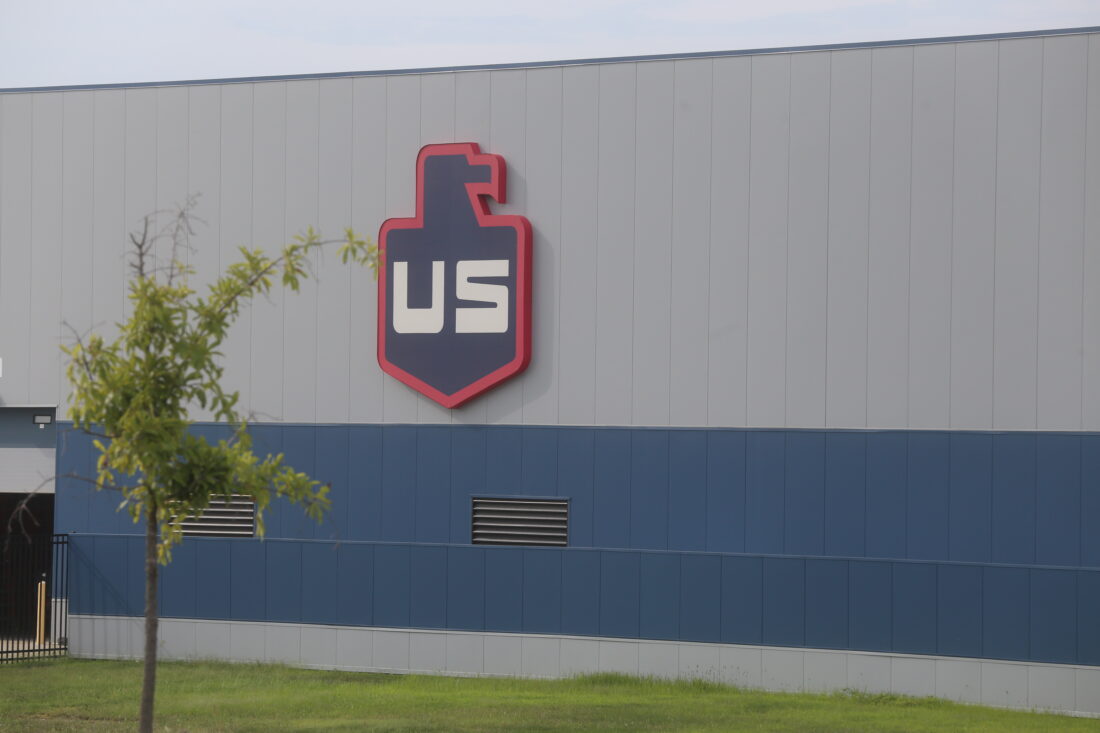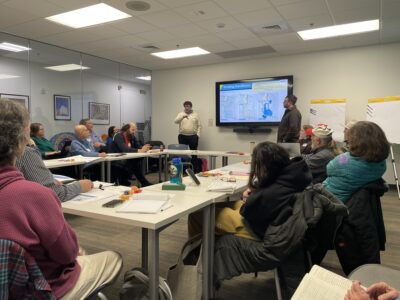As Lawrence searches for a new economic development director, interim leader says it’s ‘a really exciting time’ for growth

photo by: Chad Lawhorn/Journal-World
The former Journal-World printing plant on Massachusetts Street is seen on Monday, Aug. 4, 2025.
It’s been a year of big developments for the City of Lawrence’s economic development department, in more ways than one.
There have been the actual development projects, of course — like the massive Gateway project around the University of Kansas’ football stadium and redevelopment efforts at several long-vacant downtown sites. But Assistant City Manager Brandon McGuire says there are also important developments happening inside the department itself.
The department is still looking to replace its longtime director, Britt Crum-Cano, who retired last year, and McGuire has been serving in an interim role since she departed. Another key employee left last year as well, McGuire said, and the department was also targeted for a $176,000 budget cut, roughly 13% of its total budget from the year before, in the city’s 2026 budget process.
And, moving into next year and beyond, there could be an even bigger development at City Hall: a City Commission that has new ideas about how to spur economic growth.
Some of the candidates for the two open seats on the City Commission this year have said that the city needs to change its attitude on development — including changes to the building permit process, the city’s preferences on where development should happen, and even the role of the economic development director.
Amid all this change, McGuire doesn’t think the economic development picture in Lawrence is gloomy; far from it. He says the big projects in the community recently have been an encouraging sign, and that the city seems to be on the right track for that growth to continue.
“We’re seeing a lot of development energy that we sensed was there, and now it’s really starting to materialize,” McGuire said.
‘A wave of applications’
That energy has been on display at the Lawrence City Commission’s meetings this year, where developers have come before the commission to seek financial incentives for projects big and small.
Just over the past several months, the commission has approved tax incentives for a Q39 barbecue restaurant in part of the former Journal-World printing plant building at 639 New Hampshire St.; a redevelopment of the long-vacant Reuter building across the street from that site; and, of course, KU’s $300 million Gateway project near the stadium. (Note: The Journal-World has no ownership or involvement in the project involving the former printing plant.)
“We have had a wave of applications for incentivized development,” McGuire said.
At the same time, companies that already have offices in Lawrence have announced plans to add new facilities and lots more jobs. This summer, tech firm Alarm.com filed plans to convert about 13,000 square feet of the former Journal-World printing plant into office space for 67 employees, which would almost double its workforce in Lawrence. And US Engineering also filed plans to build a second production center at Lawrence VenturePark that could add 50 jobs.
These companies also requested incentives from the city, and McGuire said that the City Commission in recent years has made it a priority to provide incentives for companies that want to expand their operations here. An example of that is the Catalyst Program, which US Engineering requested incentives through. That program lays out a specific set of incentives for companies locating in the city’s two business parks, Lawrence VenturePark and East Hills Business Park. It was first put in place in 2017, and in June of this year the commission approved a three-year extension of the program.
McGuire described the Catalyst Program as a “fast-track program,” one meant to streamline the incentive process. The program has offered either a 50% or 70% property tax abatement for 10 years, a sales tax exemption on construction materials and free land from the city if the company builds in VenturePark or East Hills.
Incentives do mean that the city forgoes a portion of potential tax revenue from the businesses in the short term, but McGuire said bringing in new developments still helps “alleviate the disproportionate burden on property tax” paid by homeowners. Commercial and industrial property taxes are collected at twice the rate of residential property taxes, so adding more businesses shifts the burden away from homeowners once the abatements end, McGuire said.
“(These incentives) really do help bolster our tax base,” McGuire said.
Redeveloping the development staff
This wave of activity, however, has come at a difficult time, because the development department has been without a director since Crum-Cano retired last year. A senior analyst who worked with the department left last year, as well, McGuire said.
That’s left McGuire to fill the gaps in an interim basis, and he said any time there is an interim leader in a department, that presents a challenge. He said other members of city staff are also helping with development-related work, including employees in the finance department, who are currently helping to ensure that development projects are in compliance with the city’s taxing and incentive agreements. (That’s an especially important task, McGuire said, since those agreements can stretch between 10 and 20 years.)
The reason McGuire has been serving as the interim leader for so long is that it’s been taking longer than expected to find a permanent director.
Earlier in the year, the city held a search for a new director, but McGuire said it did not produce a candidate the city was satisfied with. Currently the city is conducting a second search, and McGuire said the hope is that a new director can be hired later this year.
A new economic development director would not only be able to provide analysis on development issues to the City Commission, McGuire said, but also to build relationships and collaborate with stakeholders outside of City Hall.
Many directors in the city work mostly with their own staff and employees in other city departments, but the economic development director works just as much with businesses and organizations in the community. McGuire said one of the city’s key partners for growth is the Economic Development Corporation of Lawrence and Douglas County, which receives city and county funds to help develop and recruit businesses and create more jobs in the community. Some other partners the city collaborates with frequently include KU Innovation Park and Peaslee Tech.
“It’s not really just a city government thing,” McGuire said. “It involves multiple different entities within the community.”
The candidates’ views
At least one City Commission candidate wants the new director to look farther afield than that.
At multiple candidate forums held in advance of the Nov. 4 general election, candidate Michael Courtney has said he’d like changes to how the director job is structured. He’s described what he wants as a “hunter” that works to get big companies — like Kansas City-based firms Garmin or H&R Block — to come to Lawrence. At a forum in September, he described the role as someone who could reach out to companies and “get a headquarters or a local branch here.”
“We need somebody who is incentivized to put butts in seats,” Courtney said of the development director job.
He’s not the only candidate who has opinions on the city’s development policies. Other candidates have said that Lawrence makes it too difficult for businesses to build new projects.
At a forum hosted by the Lawrence Home Builders Association and the Lawrence Board of Realtors, candidates Bob Schumm and Kristine Polian both said they thought the city’s processes could run more efficiently than they currently do. Polian said that the city often “over-legislates” things and doesn’t have enough flexibility to adapt to changing conditions, and Schumm said that for developers, “it is a very slow walk to get the permits, to get the permissions” necessary to build.
Schumm said he’s open to new ideas to speed up development processes, even suggesting that the city could explore using artificial intelligence to do the initial review of building permit applications. And Polian has said the city should change its ideas about where development should occur. She wants a greater focus on annexation of new land, and for infill development to be “a much lower priority.”
Meanwhile, the lone incumbent in the race, City Commissioner Bart Littlejohn, said he thinks the city has done a good job of working with businesses to create more jobs, more projects and more activity during his tenure. At the builders’ and Realtors’ forum, Littlejohn highlighted the high-tech production jobs created by US Engineering and the pending software engineering jobs proposed by Alarm.com.
“I’m walking the walk,” he said. “I’m actually approving things for housing, approving incentives for business and commercial development.”
It will be a couple of months before the new City Commission is seated. But no matter who is on it, McGuire is confident that there will be more applications coming in and more votes on big developments for the commissioners to take.
“This is a really exciting time for our community,” McGuire said.

photo by: Chad Lawhorn/Journal-World
US Engineering’s facility is pictured Aug. 19, 2025 in eastern Lawrence.







